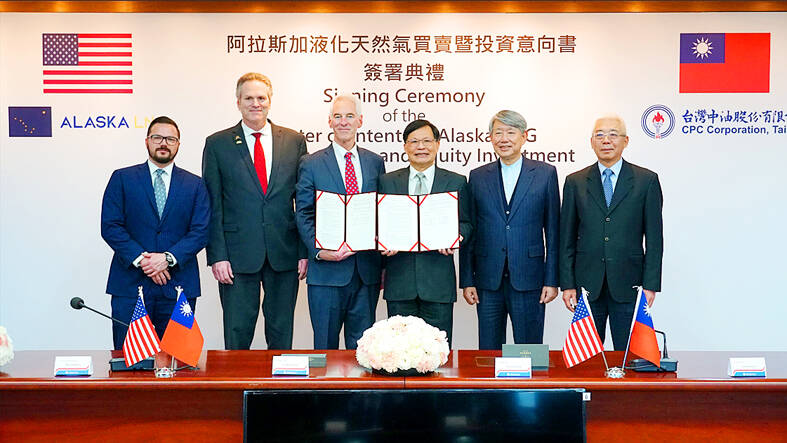State-run CPC Corp, Taiwan (CPC, 台灣中油) yesterday signed a letter of intent with Alaska Gasline Development Corp (AGDC), expressing an interest to buy liquefied natural gas (LNG) and invest in the latter’s Alaska LNG project, the Ministry of Economic Affairs said in a statement.
Under the agreement, CPC is to participate in the project’s upstream gas investment to secure stable energy resources for Taiwan, the ministry said.
The Alaska LNG project is jointly promoted by AGDC and major developer Glenfarne Group LLC, as Alaska plans to export up to 20 million tonnes of LNG annually from 2031. It involves constructing an 1,290km pipeline to transport natural gas from Alaska’s North Slope to a liquefaction facility.

Photo courtesy of CPC Corp, Taiwan
Once operational, the project would become the closest LNG supply source to Taiwan among the existing US facilities, the ministry said.
Moreover, without the need to pass through the Panama Canal, it could effectively shorten shipping time, reduce voyage risks and improve the reliability of the nation’s natural gas supply, the ministry added.
CPC president Michael Chang (張敏) and AGDC president Frank Richards signed the agreement at a ceremony in Taipei, which was witnessed by visiting Alaska Governor Mike Dunleavy and Minister of Economic Affairs J.W. Kuo (郭智輝).
The ministry said the investment agreement would help deepen the energy partnership between Taiwan and the US, and also lays a good foundation for the diversification of Taiwan’s energy supply.
Both parties are to start negotiations on procurement and investment details as soon as possible to achieve a mutually beneficial deal, it said.
The CPC-AGDC agreement came as representatives from AGDC and Glenfarne Group are visiting Asian nations this week to court investors for the Alaska LNG project, with Japan and South Korea said to also be potential targets.

South Korea’s equity benchmark yesterday crossed a new milestone just a month after surpassing the once-unthinkable 5,000 mark as surging global memory demand powers the country’s biggest chipmakers. The KOSPI advanced as much as 2.6 percent to a record 6,123, with Samsung Electronics Co and SK Hynix Inc each gaining more than 2 percent. With the benchmark now up 45 percent this year, South Korea’s stock market capitalization has also moved past France’s, following last month’s overtaking of Germany’s. Long overlooked by foreign funds, despite being undervalued, South Korean stocks have now emerged as clear winners in the global market. The so-called “artificial intelligence

‘SEISMIC SHIFT’: The researcher forecast there would be about 1.1 billion mobile shipments this year, down from 1.26 billion the prior year and erasing years of gains The global smartphone market is expected to contract 12.9 percent this year due to the unprecedented memorychip shortage, marking “a crisis like no other,” researcher International Data Corp (IDC) said. The new forecast, a dramatic revision down from earlier estimates, gives the latest accounting of the ongoing memory crunch that is affecting every corner of the electronics industry. The demand for advanced memory to power artificial intelligence (AI) tasks has drained global supply until well into next year and jeopardizes the business model of many smartphone makers. IDC forecast about 1.1 billion mobile shipments this year, down from 1.26 billion the prior

People stand in a Pokemon store in Tokyo on Thursday. One of the world highest-grossing franchises is celebrated its 30th anniversary yesterday.

Chinese artificial intelligence (AI) start-up DeepSeek’s (深度求索) latest AI model, set to be released as soon as next week, was trained on Nvidia Corp’s most advanced AI chip, the Blackwell, a senior official of US President Donald Trump’s administration said on Monday, in what could represent a violation of US export controls. The US believes DeepSeek will remove the technical indicators that might reveal its use of American AI chips, the official said, adding that the Blackwells are likely clustered at its data center in Inner Mongolia, an autonomous region of China. The person declined to say how the US government received